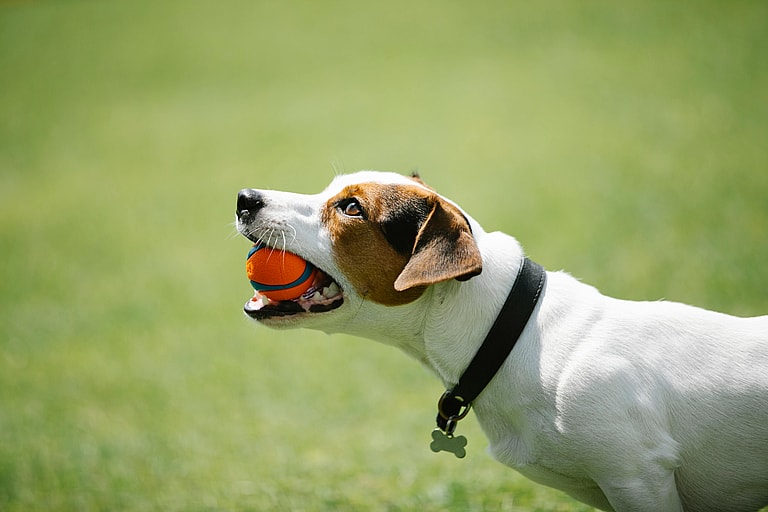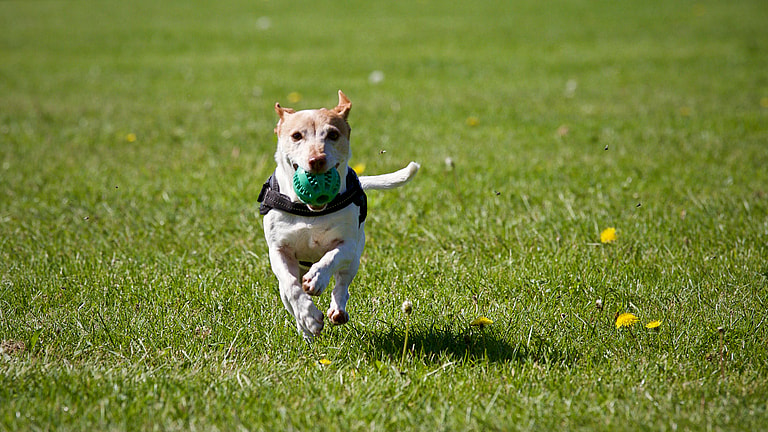Is Fetch Actually Dangerous for Your Dog? Here’s What Experts Say
Suki a dog living in Miami in a loving home, has taken the internet by storm with her hilarious antics. In a recent Instagram video, Suki’s unique way of demanding her pet parent to play fetch with her ball has captivated viewers everywhere.

Suki chomps in thin air to get her dog mom’s attention who is trying to read a book. The dog even sweetly puts her face on mom’s book at one moment, but then continues chomping and making teeth-clattering noises. Finally, her parent relented and threw the ball for the furry friend to fetch.
Source: @sukipatooki on Instagram
Suki Is A Viral Sensation
Seeing Suki’s way of expressing her wishes to play, her mom amusingly called her an alligator as the video in-text read, “pov: your alligator wants to play fetch.” This Instagram video of the adorable dog has everyone in stitches, garnering more than 78K likes. Moreover, many people are sharing their reactions to the canine in the comments section.

A user, Erin Rainy Fisher, left a comment, saying, “I literally can’t with her face 😭❤️ SO CUTE.” Another user, Claudia, wrote, “Hee hee — Suki is cute! Maybe Suki could be an alligator 🐊 for Halloween! 👻🎃 🐶🐾🩷”
Playing Fetch––Is It Good For Your Dog?

Lots of dogs love playing fetch. For the owners, it is a great way to exercise their furry friends and bond with them. Meanwhile, dogs love it because “it stimulates the act of chasing prey,” according to a certified dog trainer, Jennifer Malawey.
In recent years, however, some dog experts have raised concerns about the downsides of fetch. Sarah Lewis, a canine physiotherapist warned against “consistently throwing a ball” explaining it is not healthy for a dog’s physical and mental well-being.
Lewis shares the story of her late Springer Spaniel, Harley, who was obsessed with playing fetch. However, due to Harley’s constant engagement in such high-impact exercise—along with genetic factors—she eventually developed hip dysplasia.
In addition, Lewis claims that research shows excessive fetch can elevate adrenaline and cortisol levels in dogs. These hormones are linked to compulsive behaviors, and even triggering a fight-or-flight response.

A Reddit user, u/deletebeep, shares what their trainer has to say about fetching behavior. They state, “My trainer told me that mindless fetch is a bad idea, but fetch with training and games incorporated is excellent. For example, I make my dog lie down and wait to run for the ball until I give her a cue; I have her perform tricks before I throw the ball; I hide the ball somewhere in the park and have her search for it. The searching in particular is really tiring for her.”
Vet’s Opinion About Fetch
Veterinarian Hannah Capon expresses concern over a disturbing trend, where dog owners are increasingly distracted by their mobile phones while playing fetch with their pets, continuing to throw balls until the dogs are utterly exhausted. This excessive exercise, Capon warns, not only strains joints and muscles but also takes a toll on the dogs’ mental well-being, leaving them overstimulated and stressed.
Founder of Canine Arthritis Management, Capon urges owners to abandon ball launchers and “Nerf guns” that propel balls at high velocities, citing concerns over the intense physical demands placed on dogs. She emphasized that asking dogs to chase high-speed balls is akin to expecting them to perform like professional athletes. Dogs go from a standstill to a sprint, leap into the air, and abruptly brake and skid, putting immense strain on their bodies.

Capon advises the following things to consider when throwing the ball to their dogs:
Pre-Play Checks
- Ensure your dog is healthy and injury-free
- Verify your dog has no mobility issues
Safe Play Guidelines
- Warm up your dog before playing with a ball to prevent muscle strain
- Avoid playing on slippery surfaces, hills, or beaches for extended periods
- Hand-throw or roll the ball on the ground instead of launching it high, forcing your dog to jump
- Set a time limit for ball chasing to prevent overexertion
Following these guidelines will allow pet parents to play the game of fetch responsibly with their dogs, minimizing the risks and protecting their furbaby’s health.
To Fetch or Not Fetch?
The opinions on exercising your dog by playing fetch vary among experts.
According to a dog training facility in New York City, Amanda Gagnon Dog Training, there are two distinct types of fetch:
- Problematic Fetch: Distracted owners toss balls until dogs collapse from exhaustion, potentially causing overarousal and poor communication.
- Constructive Fetch: A training game where owners reward desired behaviors, teaching impulse control and calmness while providing physical and mental stimulation.
Responsible fetch play offers numerous benefits for dogs, including teaching valuable life skills and strengthening the human-dog bond. When played thoughtfully, fetch helps dogs develop impulse control and calm behavior, even in the face of exciting distractions.
Additionally, it provides an outlet for instinctual retrieving behaviors, allowing dogs to express their natural instincts in a healthy and constructive manner. Perhaps most importantly, fetch fosters deep bonding and enjoyment between dog and owner, creating a sense of connection and joy that transcends mere physical activity.

Therefore, they assert that fetch, when approached responsibly, is a beneficial activity for dogs. The key to its success lies not in the game itself, but in how it’s played. In fact, denying retrieving breeds the opportunity to engage in instinctual behaviors can negatively impact their welfare.





